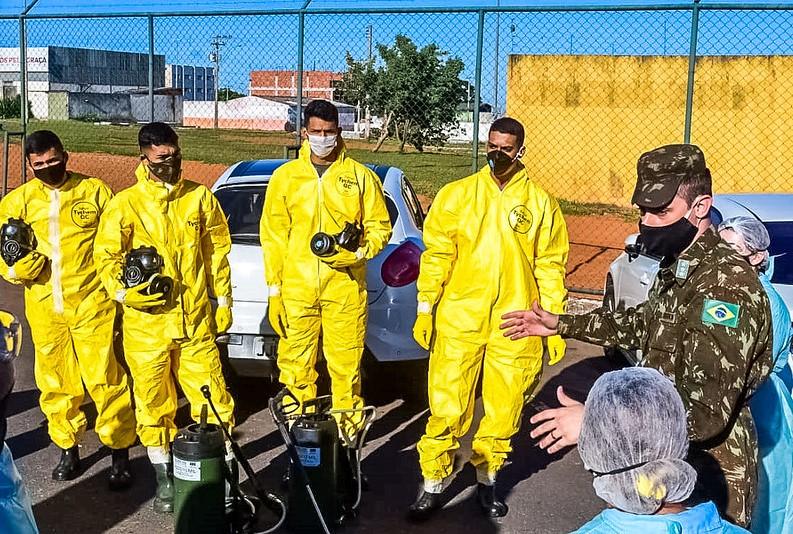The global COVID-19 total passed 5 million today, with daily cases in Brazil starting to reach levels seen in the United States and Doctors Without Borders sounding an alarm about catastrophic spread of the novel coronavirus in Yemen.
It took 12 days for the pandemic total to rise from 4 million to 5 million, the same as it took for illnesses to jump from 3 million to 4 million. The global total is now at 5,047,377 cases, and 329,816 people have died from their infections, according to the Johns Hopkins online dashboard.
As Brazil cases rise, US considers travel ban
Brazil, which earlier this week became the world's third hardest-hit nation, behind the United States and Russia, reported a daily high of 21,472 cases yesterday, similar to the US daily total of 22,140. In the United States, President Trump said he is considering a ban on travel from Brazil, owing to its quickly accelerating outbreak, according to media reports.
A few days ago, Sao Paulo's mayor warned that the city's hospitals would soon be overrun with COVID-19 patients, and lawmakers in Brazil are considering a law to require wearing face masks in public areas.
The outbreak is playing out amid controversial policies of Brazilian President Jair Bolsonaro, who has downplayed the threat and discouraged lockdowns. Two health ministers have been fired or have resigned. The most recent one, Nelson Teich, reportedly clashed with the president over the use of distancing measures and hydroxychloroquine, a malaria drug that has unproven benefits and can be harmful to certain risk groups.
Bolsonaro yesterday on Twitter said the country will introduce new guidelines to expand the use of hydroxychloroquine.
COVID-19 cases are rising quickly in other Latin America countries, such as Peru, where cases have doubled over the past 2 weeks, giving it the second most cases in the region behind Brazil, Reuters reported. A lockdown in Peru is in effect until May 24, and surging cases are straining hospitals and leading to shortages of drugs such as acetaminophen and amoxicillin.
Earlier this week, the head of the Pan American Health Organization said recent spikes in cases and deaths in the Americas were related to the virus taking root in poor and vulnerable groups, including those in indigenous communities and in densely populated urban areas.
MSF: Yemen faces catastrophic outbreak
Elsewhere, Doctors Without Borders (MSF) warned today that a catastrophe is unfolding the Yemen current capital city of Aden, where it has a COVID-19 treatment center that covers the southern part of the country.
In a statement, MSF said that, from Apr 30 to May 17, it admitted 173 patients, 68 of whom died. In a statement, the nonprofit said many patients are arriving at the center in acute respiratory distress, making it hard to save their lives and pointing to more extensive illness levels in households.
Government burial records suggest that 80 people a day are dying in their homes, up sharply from the daily baseline of 10. MSF said it had treated several healthcare workers and that many of its own staff are sick. Aden has a population of about 800,000.
Caroline Seguin, MSF's operations manager for Yemen, said the high mortality levels they're seeing in Aden are similar to those seen in Europe's intensive care units, but the people dying in Yemen are much younger—with men ages 40 to 60 as the hardest-hit group. She urged the United Nations and other donors to do more to help Yemen, which needs money to pay healthcare workers and for personal protective equipment and oxygen concentrators.
World Health Organization (WHO) officials have also raised alarms about the worrying situation developing in Yemen, with cases reported in both the north and the south of the war-torn country.
Indonesia cases rise, holiday travel concerns
Indonesia yesterday reported its highest daily total, with 973 new cases, Reuters reported. To help contain the outbreak, the country's president has banned people from traveling for holidays after Ramadan, which ends next week. However, thousands of people are already leaving Jakarta, the country's outbreak epicenter, raising worries that people could spread the virus to their hometowns during the Eid holiday visits.
People are allowed to travel with proof of reason and a health certificate and police are monitoring checkpoints, but media reports say people are getting fake medical certificates online.
In other global developments:
- The Tokyo summer Olympic Games, postponed until next summer, will be cancelled if they need to be cancelled again for COVID-19 reasons, the head of the International Olympic Committee told the BBC Japan's president has said he hope a decline in virus levels next year and an availability of a vaccine will allow the postponed games to take place.
- Wuhan, China's original epicenter, has banned the eating of wild animals and is offering farmers money to stop breeding exotic animals for food to reduce the risk of viruses such as COVID-19 from jumping from animals to people, CBS News China today reported two new cases, one of them imported and one from Shanghai; it also reported 31 more asymptomatic cases, 3 of them imported, according to the National Health Commission.
- Iran's state media said 10,000 healthcare workers have been infected in its outbreak, some of them fatally, Reuters reported, though it did not list the number of deaths.
- Swedish health officials said a seroprevalence study of Stockholm residents suggests that 7.3% of the population have been exposed to COVID-19, CNN Anders Tegnell, PhD, MSc, the country's chief epidemiologist, said the number was lower than expected, but not by much. Sweden has taken a different response approach to much of the rest of Europe, forgoing strict lockdowns. Global health officials have warned that low seroprevalence levels they are seeing mean the world is vulnerable to another wave of pandemic activity.






















